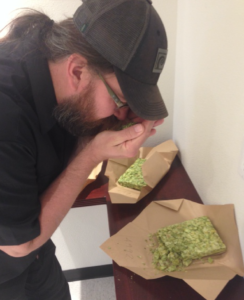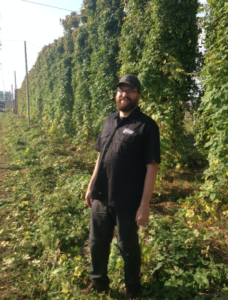Yakima Valley Hop Selection 2017

Bev-Craft Director of Brewing
I woke up in the sleepy, unassuming town of Yakima, Washington, the epicenter of the hop growing capital of North America. The hop growing region in the Yakima River valley starts near the town of Yakima and extends for approximately 50 miles downstream—almost down to where the Yakima River empties into the Columbia River. While apples, cherries, peaches and wine grapes take the prime growing real estate near the edge of the Yakima River, hop plants are content to grow on the land further up the banks.
I am out here this week selecting hops for Earth Rider Brewing. This is my sixth year coming to the Yakima Valley during the hop harvest. This area becomes a who’s who of brewers this time of year. I’ve run into brewers from national craft brewing powers like New Belgium, Russian River and Sierra Nevada as well as Midwestern breweries like Summit, Half Acre and Surly. They are all here to examine this year’s crop, meet with hop growers, and select hops for the coming year. Hops are one of the four main ingredients used in brewing beer, along with malted barley, water and yeast.
Hops have become an especially important ingredient for craft brewers in the US since IPAs have become so popular over the past decade. With the explosive growth in the number of craft breweries, the competition for sought-after hop varieties has increased. Most breweries now have hop contracts to ensure they have the supply they need for the beers they want to produce.
Hop selection is an important tool that breweries can use to make sure they are getting the quality and flavor of hops they desire. There are over 40 commercially available varieties grown in the Yakima valley and each one has distinctive flavors. Brewers have a hop-flavor profile in mind when they design a recipe and choose the hop varieties based on that profile. But hops are an agricultural product, thus the character of a hop will vary based on where it was grown, the growing conditions that year, and when the plant was harvested. So even within a hop variety, Cascade for instance, there can be a large variation in the characteristics. As it turns out, a Cascade is not a Cascade is not a Cascade. So hop contracts ensure that we have an adequate supply of the hops we need, but hop selection allows brewers to hone the particular characteristics within those varieties that we desire.
This morning I am heading to Hopsteiner’s main offices in Yakima to meet our rep, Doug Wilson. We are going to tour one of their farms and hop-processing facilities in the lower valley south of Yakima called River Ranch. Also in the van with us are three brewers from Half Acre Brewing in Chicago.

River Ranch has one of the newest, most-advanced hop-processing facilities in the country. Hopsteiner uses combines in the field when harvesting hops which reduces the amount of extraneous plant material (vine and leaves) that make it to the processing facility. When the trucks arrive at the processing center, they empty their load onto a conveyor belt that runs to the separating part of the plant. The goal here is to isolate the hop cones from the rest of the plant material. This is accomplished by a dizzying array of belts and shakers and screens. The hop cones are then sent by conveyor to the kiln. Hops must be dried or else they will spoil quickly. The hops spend about eight hours in the kiln, give or take depending on the hop variety. The moisture percentage of the hops is monitored and when they reach a certain level of dryness, the hops can be removed from the kiln. The dried hops are then sent to the conditioning room where they cool before being put into 200-pound bales. These bales are shipped to warehouse in Yakima where they are kept cold until they can be processed further into pellets. The engineering behind this place is impressive. It is staggering how much money is invested into hop-processing facilities that are only used for about six weeks a year!
When we returned from our tour it was time to do our hop selection. There were three lots available for me to choose from for each of the varieties we had on contract. The hop growers in the Yakima valley do a great job, so I have some excellent options to choose from.
We assess the hops by taking a small amount and rubbing them briskly between our hands. This releases the aromas from the hop oils. Then we smell the rubbed hops in our hands to see what we detect, good or bad. We are looking to select a lot of hops that have the desired characteristics we are looking for without having negative characteristics that we don’t want. I was able to get the aroma profiles we are looking for in all of our contracted hop varieties. Hop selection was a success!
I look forward to brewing with these hops throughout the year until I return next fall to experience the hop harvest in Yakima Valley.
